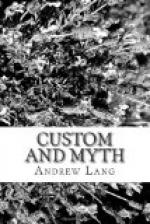The perusal of Mr. Max Muller’s book deeply impresses one with the necessity of studying early religions and early societies simultaneously. If it be true that early Indian religion lacked precisely those superstitions, so childish, so grotesque, and yet so useful, which we find at work in contemporary tribes, and which we read of in history, the discovery is even more remarkable and important than the author of the ‘Hibbert Lectures’ seems to suppose. It is scarcely necessary to repeat that the negative evidence of the Vedas, the religious utterances of sages, made in a time of what we might call ‘heroic culture,’ can never disprove the existence of superstitions which, if current in the former experience of the race, the hymnists, as Barth observes, would intentionally ignore. Our object has been to defend the ’primitiveness of fetichism.’ By this we do not mean to express any opinion as to whether fetichism (in the strictest sense of the word) was or was not earlier than totemism, than the worship of the dead, or than the involuntary sense of awe and terror with which certain vast phenomena may have affected the earliest men. We only claim for the powerful and ubiquitous practices of fetichism a place among the early elements of religion, and insist that what is so universal has not yet been shown to be ‘a corruption’ of something older and purer.
One remark of Mr. Max Muller’s fortifies these opinions. If fetichism be indeed one of the earliest factors of faith in the supernatural; if it be, in its rudest forms, most powerful in proportion to other elements of faith among the least cultivated races (and that Mr. Muller will probably allow)—among what class of cultivated peoples will it longest hold its ground? Clearly, among the least cultivated, among the fishermen, the shepherds of lonely districts, the peasants of outlying lands—in short, among the people. Neglected by sacred poets in the culminating period of purity in religion, it will linger among the superstitions of the rustics. There is no real break in the continuity of peasant life; the modern folklore is (in many points) the savage ritual. Now Mr. Muller, when he was minimising the existence of fetichism in the Rig Veda (the oldest




